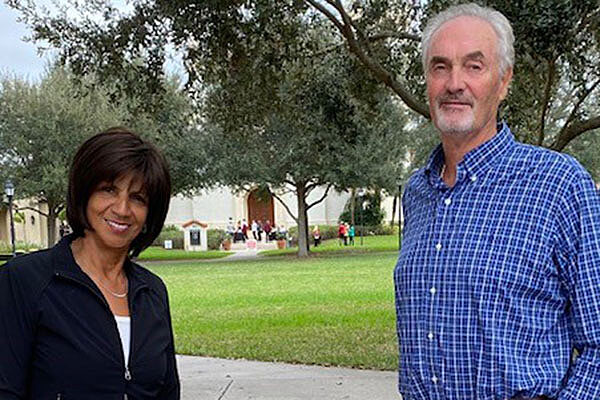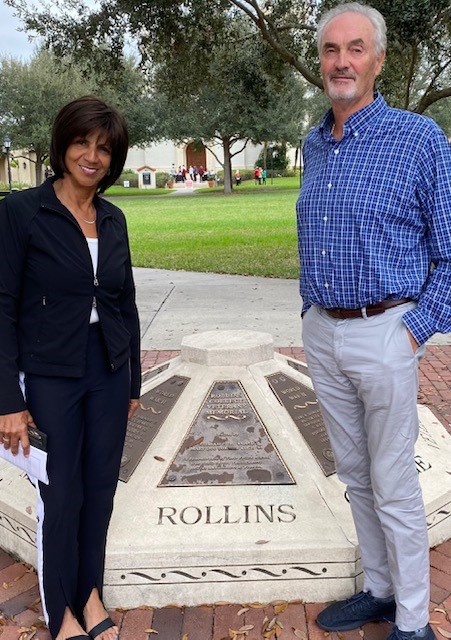Think F.A.S.T.: A Stroke Survivor’s Story

Meet Richard “Rich” Rollins, a spirited 70-year-old retiree who relocated to The Villages all the way from upstate New York. Rich and his wife, Cassandra, revel in their shared love for fitness, frequently hitting the gym for cardio exercise and weightlifting. You can find Rich and his friends playing pickleball about five times a week.
You would never guess that Rich is a three-time stroke survivor.
In 2006, Rich had a stroke while driving his car. He didn’t lose any movement or speech and was able to get medical help quickly. His second stroke happened in 2017 after having a heart procedure known as a cardiac ablation. Despite the setback, Rich recovered and enthusiastically resumed his active lifestyle.
Think F.A.S.T.
In February 2023, Rich and his wife were sitting on the couch in their living room when Cassandra noticed he couldn’t talk and his face was drooped.
“She knew exactly what to do,” Rich said. “She called 911. By the time the ambulance arrived, I couldn’t move the left side of my body.”
The ambulance transported Rich to UF Health The Villages® Hospital, where scans showed he had a blood clot blocking a major blood vessel in his brain. The clot’s location explained his symptoms, and he was diagnosed with an ischemic stroke caused by a large vessel occlusion.
“Stroke is a very serious condition that requires immediate medical attention,” said vascular neurologist Amita Singh, MD, an assistant professor at the University of Florida Department of Neurology. “When a stroke occurs, brain cells begin to die, which can lead to permanent brain damage or even death. The extent of damage depends on the type of stroke, location of blockage and how quickly treatment is received.”
UF Health Experts Step In
As soon as Rich’s scans confirmed a brain blockage, UF Health stroke neurology was contacted, and Dr. Singh and her team evaluated Rich’s case.

“Richard was not eligible for clot-busting medication due to medications he was already taking,” Dr. Singh said, “but he was eligible for a procedure where a catheter is used to remove the blood clot, called a mechanical thrombectomy.”
Dr. Singh recommended Rich be immediately transferred to the UF Health Shands Comprehensive Stroke Center in Gainesville to have the procedure. That is when Matthew Koch, MD, an assistant professor and neurosurgeon at the UF Department of Neurosurgery, was called.
“We work very closely with the stroke and neurology team,” Dr. Koch said. “As soon as there is a patient that would potentially benefit from a thrombectomy, they alert us to activate our team to make sure everything is ready upon arrival.”
The stroke and surgical teams met Rich in the emergency department as he arrived, and he was taken directly to the operating room. Dr. Koch and his team quickly reestablished blood flow to Rich’s brain by accessing a leg artery, navigating to the blockage and removing the clot.
The Road to Recovery
Even though Rich’s procedure was a success, he still had a long road ahead of him. He saw a handful of specialists, including speech therapists, occupational therapists, cardiologists, neurologists and electrophysiologists.
“Stroke recovery is typically a gradual process and occurs over weeks to months, and sometimes even years,” Dr. Singh said. “The length of time and how much an individual recovers can vary widely depending on the type of stroke, location and adherence to a rehabilitation program.”
In addition to rehabilitation, Dr. Singh stresses the importance of having an individual treatment plan for every patient.
“My goal is to ensure my patients understand why they had a stroke and create a realistic, individualized treatment plan along with strategies to prevent future strokes,” she said. “We create both short-term and long-term goals as it relates to medication management, rehabilitation, lifestyle modification and emotional support, if needed.”
Enjoying Life Again
Recently, Rich has started going to the gym and playing pickleball again.
“I don’t know how long I have to live, but I am going to try to enjoy myself while I’m here,” he said.
To his team of medical professionals, Rich has a message: Thank you.
“You all saved my life and prevented me from not being able to enjoy my life.”
Frequently Asked Questions
What are the symptoms of a stroke?
To help you remember the signs of a stroke, think F.A.S.T.
- Face drooping
- Arm weakness
- Speech difficulty
- Time to call 911!
I am having new stroke symptoms. Should I call 911?
Yes! Stroke is considered a medical emergency, and time is a big factor in getting the appropriate treatment. There are two main treatments we consider with stroke: a clot-busting medication or a surgical procedure to remove a large clot, if one is present. These treatments are time-sensitive, so it is critical to call 911 to get to the closest emergency room as fast as possible.
What are the different stroke types?
There are two main types of stroke:
• Ischemic, when there is lack of blood flow to the brain, often from a blockage • Hemorrhagic, when there is bleeding in the brain
What causes a stroke?
There are several reasons for having a stroke, and determining the cause often requires testing, both while in the hospital and after discharge. Common risk factors are high blood pressure, smoking, high cholesterol, diabetes, heart disease, obesity and a family history of stroke. It is important to have a discussion with your medical provider to form a treatment plan to prevent future strokes.
Learn more about stroke and how UF Health is bringing leading-edge stroke care to the community.
